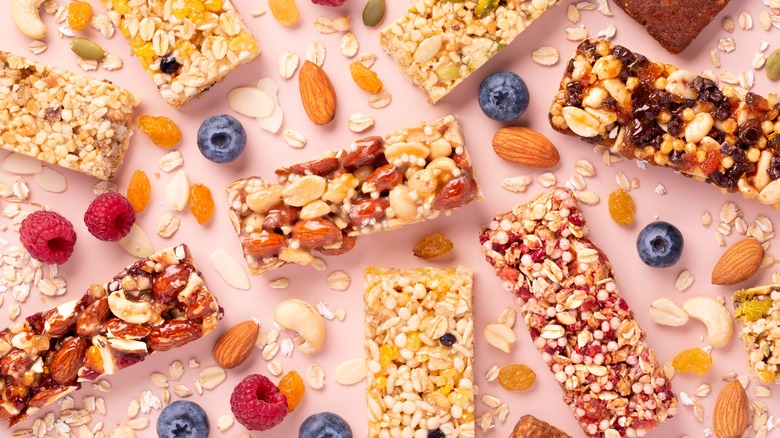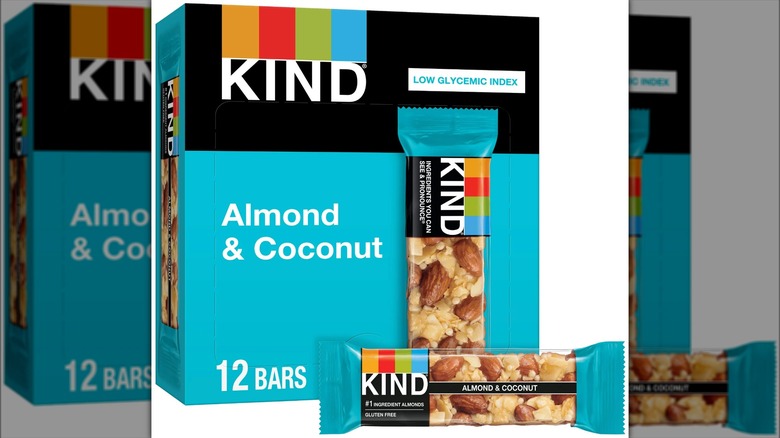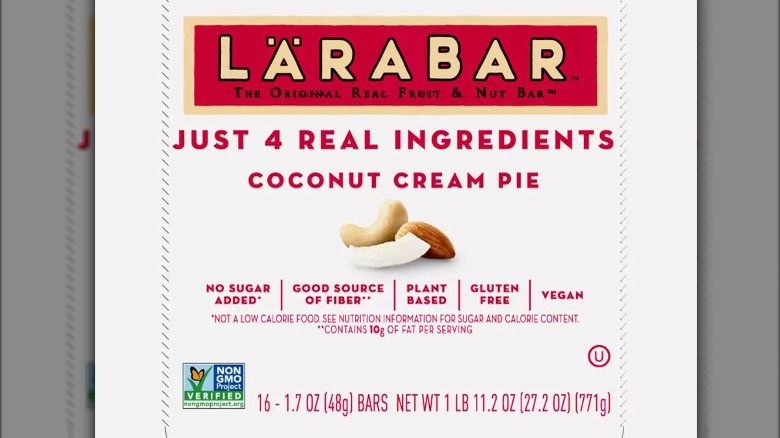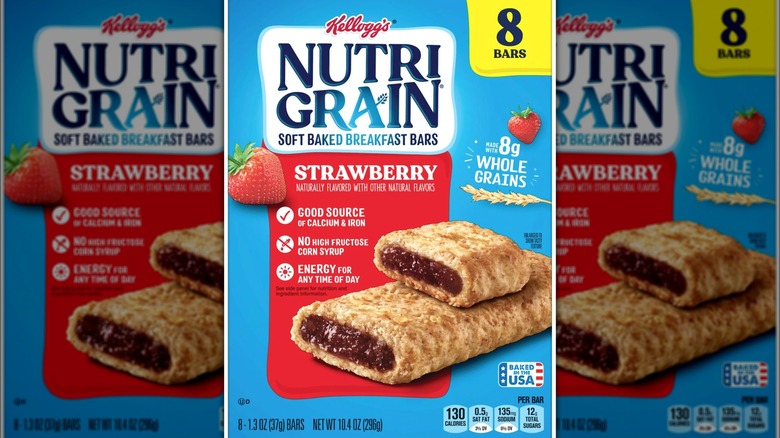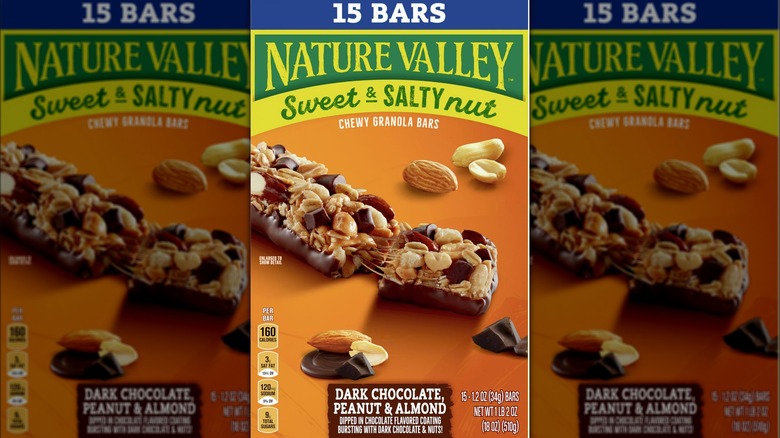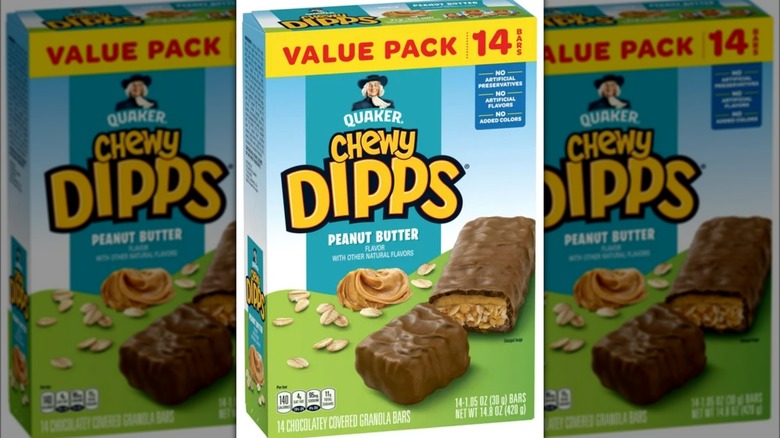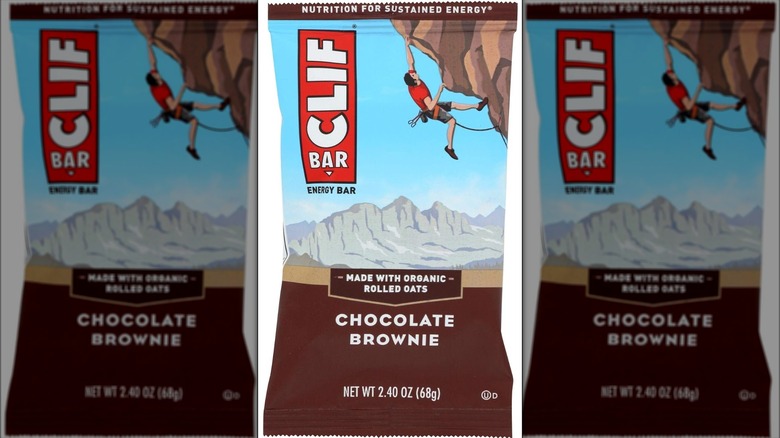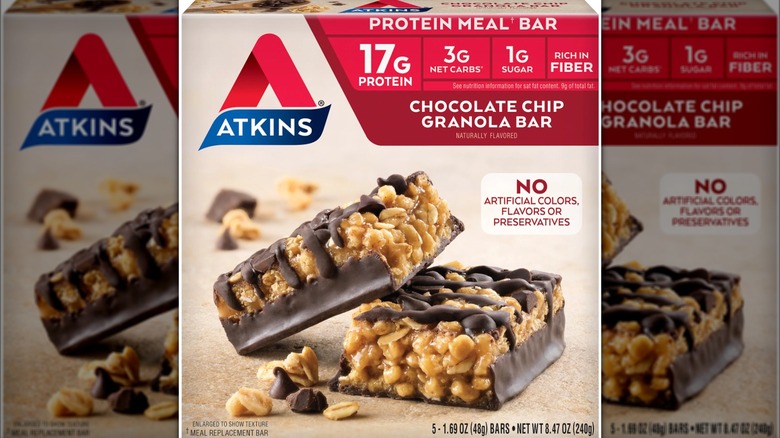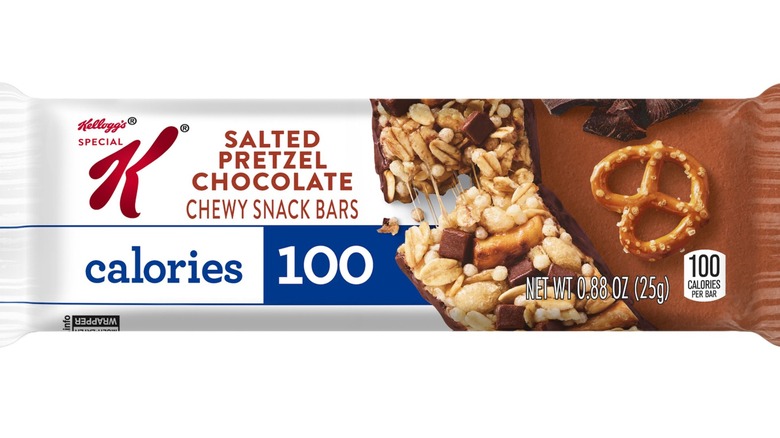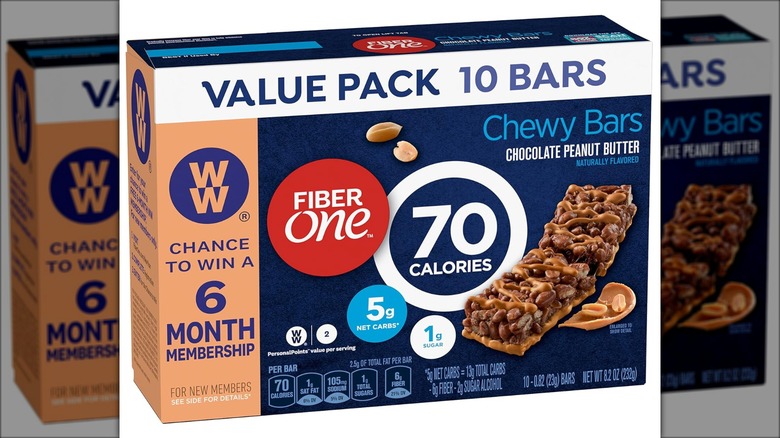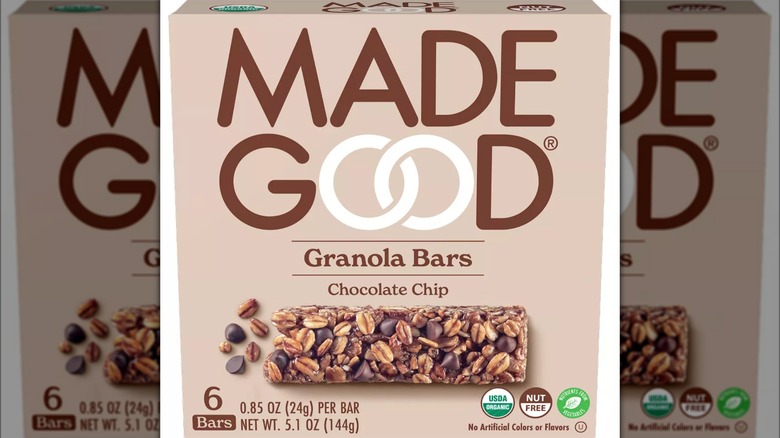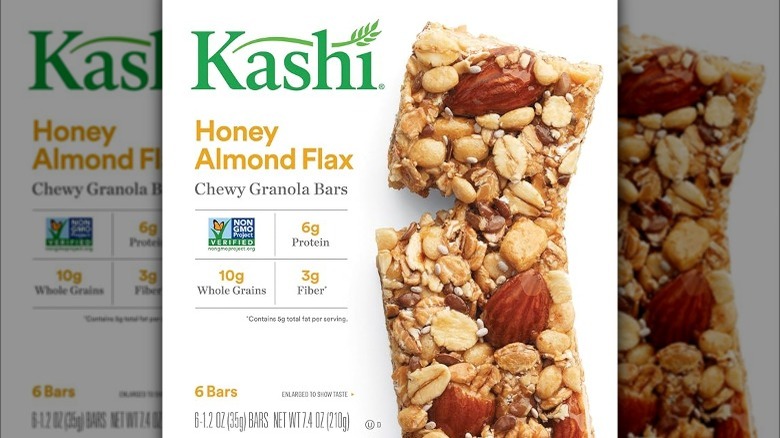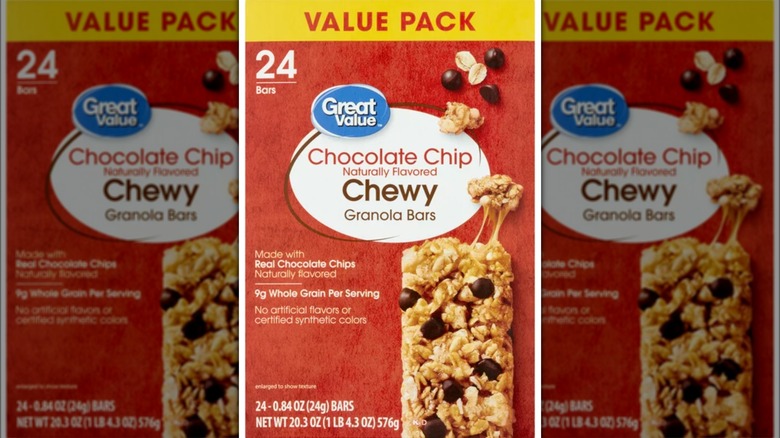12 Of The Unhealthiest Store-Bought Granola Bars
We may receive a commission on purchases made from links.
If you've craved a snack in the last week, it's possible you considered eating a granola bar. This type of bar is a relatively recent invention, first going mainstream in the 1970s, but in just a few decades, it's become the go-to breakfast or snack option for millions of people. In 2022, the granola bar market was valued at just over $4.5 billion, according to Data Bridge Market Research – as it becomes more crowded, that number is only set to grow.
One of the main strengths of granola bars is how versatile they are. While granola and granola bars are traditionally made primarily from oats, they can be virtually any combination of fruits, nuts, seeds, and other grains. This versatility, however, can also mean that food manufacturers pump many other ingredients into their bars. This can turn a food item traditionally seen as healthy into something full of added sugar, saturated fat, or alternative sweeteners with their own health question marks.
In this article, we sought to find the unhealthiest granola bars on the market to help you avoid having to decipher some pretty cryptic labels. We primarily focused on granola bars with high levels of saturated fat, sugar, or other additives. We also included bars lacking fiber, making them inadequate for quenching hunger.
1. KIND Almond & Coconut Bar
In under two decades, KIND has become a significant player in the granola world. The company was founded in 2004 with a mission to create tasty snack bars that were also rich in nutrition. So it's a real shame to see that some of its granola bars are pretty much the unhealthiest you can find, like its Almond & Coconut Bar. In each bar, there are 7 grams of saturated fat, amounting to a whopping 35% of your daily value in a single snack.
It's only fair to point out that this comes from whole sources, with the bar primarily composed of almonds and coconut. However, just because the saturated fats come from a plant-based source like coconut doesn't mean they can't have the same cholesterol-raising effects.
Furthermore, there are also 8 grams of added sugar in the KIND Almond & Coconut Bar. Added sugar regularly finds its way into prepared snacks like this, no matter how healthy they seem. And while they provide sweetness, they can also provide calories without any additional significant nutrition and create higher risk factors for several common chronic diseases, especially in children and adolescents, according to research published in the European Journal of Paediatric Dentistry.
2. LÄRABAR Coconut Cream Pie
Everything about LÄRABAR's brand screams wholesomeness. From its slogan of "Simple. Pure. Delicious." to its simple packing promising that its bars are plant-based, gluten-free, and vegan, it's reasonable to expect these granola bars to be a healthy treat.
Unfortunately, folks, you'll need to look a little closer at some of its options, like the Coconut Cream Pie flavor. This bar contains a high amount of saturated fat, with 7 grams per 48-gram bar. This saturated fat may come from whole sources, and LÄRABAR is admirable in trying to keep its ingredient lists down, with the Coconut Cream Pie only containing four ingredients. But the fact remains that saturated fat is far less healthy than unsaturated kinds, with excessive consumption elevating cholesterol levels, which may then affect your heart disease risk negatively, according to the Mayo Clinic.
It's also crucial to remember that this level of saturated fat is more than you might get in a lot of meals, and it's being supplied in a snack bar. When you add the fact that 20 of its 28 grams of carbohydrates are sugars and that it only contains 3 grams of protein, it paints a picture of a fat- and sugar-rich granola bar that won't fill you up much.
3. Nutri-Grain Strawberry Bar
We wouldn't blame you if you thought Nutri-Grain bars were healthier than they are. From the very name, combining "nutritious" and "grain," the Kellogg's-owned brand appears to be a healthy option.
But its Strawberry flavored bar is anything but. "This bar should be a no-go as its primary response in the body is to raise glucose rapidly, which eventually crashes and leaves the consumer feeling just as hungry as before their meal," said registered dietitian Trista Best via Eat This, Not That.
It does this via a combination of high levels of added sugars and virtually no fiber to counteract them. In each bar, there are 12 grams of added sugars, almost a quarter of the daily value. This comes mainly from the filling, which is little more than an ultra-processed strawberry jam, with no whole fruit whatsoever to be found anywhere, which could have provided important fiber, vitamins, and minerals.
Speaking of fiber, there is just 1 gram in the entire bar, leaving your blood glucose at the mercy of the sugar content inside. And all of this, combined with the small 2 grams of protein, means that this is a snack that's more likely to make you hungry than sate your appetite.
4. Nature Valley Sweet & Salty Dark Chocolate, Peanut & Almond
Granola bars have grown increasingly sophisticated over the years, with ever-evolving ingredient combinations offering customers plenty of flavors to choose from. Unfortunately, this drive for innovation has also left a lot of granola bars looking not that much different from regular candy.
This is definitely the case with Nature Valley Sweet & Salty Dark Chocolate, Peanut & Almond bars. Each bar comes studded with chocolate chips and nuts, a chocolate-covered underside, and extra ingredients significantly raising its saturated fat and sugar content.
In each bar, there are 3 grams of saturated fat (15% of your daily value) and 9 grams of added sugars, with no naturally occurring sugars to be found anywhere. This added sugar content comes largely from corn syrup, the second listed ingredient on the box, which is a sweetener that's totally devoid of any nutrition.
Instead, it just provides empty calories. Importantly, too, the fat in the bar may partly come from the peanuts and almonds, but it also comes from palm kernel oil and canola oil. Canola oil, in particular, can have an inflammatory effect, and consuming large amounts of it could have a negative effect on brain and heart health, according to Healthline.
5. Quaker Peanut Butter Chewy Dipps
Many granola bar manufacturers include peanuts or peanut butter in their recipes, with the plant-based ingredient providing protein, fat, and fiber. But in Quaker's Peanut Butter Chewy Dipps, some of the nutrients seriously outweigh the others.
This granola bar isn't exactly the picture of health, with its ingredients enclosed in a thick layer of chocolate. Insider, there are 11 grams of added sugars, approximately 21% of the average daily value, as well as 6 grams of fat.
These ingredients and the type of fat inside create some issues. "Over half the amount of fat in this bar is from saturated fats, which can be damaging to the heart and provide no true benefit to the consumer and the amount of sugar will create a dopamine reaction in the body that will increase their desire for more, which begins a dangerous cycle with high sugar foods," explains registered dietitian Trista Best via Eat This, Not That.
High fructose corn syrup provides high sugar content, with the sweetener's fructose content contributing significantly to weight gain and impacting insulin sensitivity, according to Hartford Healthcare. Additionally, any fiber or protein content you might have received by having whole peanuts in the recipe is eradicated here, with each Chewy Dipps bar containing just 2 grams of protein and 1 gram of fiber.
6. CLIF Chocolate Brownie
Commercially-made granola bars are usually pretty sweet, and CLIF's Chocolate Brownie is no exception. The snack bar producer combines rolled oats with unsweetened chocolate cocoa, a range of organic sweeteners, and other ingredients to make a bar that initially appears nutritious.
But that's until you see its salt content. With 180 milligrams of sodium per portion, the CLIF Chocolate Brownie bar has 8% of the average daily value for the nutrient — and that's a fair amount for a food item designed to be sweet, not savory.
Sweet and salty is a classic combination, with saltiness potentially serving to heighten the activity of sweet receptors on our tongues, giving sugar or other sweeteners a more potent effect and enhancing flavor. However, it's easy to forget to account for the salt content in sweet foods, and this could lead to consuming too much sodium.
As well as this, the CLIF Chocolate Brownie bar has a staggeringly high level of added sugar from the inclusion of three different types of syrups. With 16 grams per bar, it's higher than most of the other granola bars on our list and provides almost a third of the recommended daily value.
7. Atkins Chocolate Chip Granola Bar
The Atkins brand evolved from the eponymous low-carb diet created by Robert Atkins, and nowadays, it seeks to create low-carbohydrate food options for followers of its lifestyle. But just because something is low in sugar doesn't make it healthy, as the Atkins Chocolate Chip Granola Bar shows.
This snack bar may only have 3 grams of net carbs and 1 gram of sugar, but it gets its sweetness from sucralose. This artificial sweetener, which is most commonly sold as Splenda, has been associated with a higher risk of several different health issues.
Research published in the Canadian Journal of Gastroenterology has discussed a link between consumption of sucralose and irritable bowel syndrome due to sucralose's negative impact on gut bacteria. As well as this, cutting sugar out of your diet and replacing it with sucralose may seem like an excellent way to limit type 2 diabetes risk. However, further research published in Diabetes Care has observed that consumption of artificial sweeteners, primarily through diet soda, has actually resulted in a greater risk of developing the disease.
Additionally, don't forget that the Atkins Chocolate Chip Granola Bar is high in other areas you might not expect. With 5 grams of saturated fat, each bar has a quarter of the recommended daily value for the nutrient.
8. Special K Salted Pretzel Chocolate Chewy Bars
Special K may be famous for its breakfast cereal, but it has expanded its range into a host of other breakfast items, including the Special K Salted Pretzel Chocolate Chewy Bars. However, while these bars may fall in line with Special K's original marketing slant of being a low-fat, low-calorie option, that doesn't exactly make them healthy.
In fact, you may end up being even hungrier after eating a Special K Salted Pretzel Chocolate Chewy Bar, with each bar containing just 1 gram of fiber and protein. Both fiber and protein are vital nutrients aiding satiety and weight loss due to their ability to keep you full longer.
Fiber takes longer to digest than other nutrients, keeping your stomach containing food longer, whereas protein takes longer to metabolize, helping to sustain you. Without either of these nutrients on display in the Special K Salted Pretzel Chocolate Chewy Bars, the granola bars get their calories largely from carbohydrates, including 7 grams of added sugars. According to Everyday Health, this sugar content may end up making you hungrier by causing a craving for sugar as a result of eating sugar in the first place.
9. Fiber One Chocolate Peanut Butter
Fiber is one of the most essential nutrients we can get in our diets and has a positive impact on a number of health risk factors, including blood pressure and cholesterol, according to the Mayo Clinic. So you would think the Fiber One Chocolate Peanut Butter granola bar, which contains 6 grams of fiber with just 1 gram of sugar, would be a healthy choice.
However, that's far from the case. Not only does that single gram of sugar come partly from corn syrup, but the bar largely gets its sweetness from the artificial sweetener erythritol. Worryingly, consuming erythritol has been linked to higher incidences of cardiovascular disease in a study published in Nature Medicine.
"We were looking for compounds in blood that predict risk for experiencing a future heart attack or stroke. The top candidate that kept showing up was erythritol," states preventive cardiovascular medicine Stanley Hazen, who also worked on the study, per the Cleveland Clinic.
It's thought that erythritol could be associated with a coagulative effect on blood, which causes it to form clots in your bloodstream. While it's not totally clear whether erythritol is the direct cause of these clots, Hazen pointed out that even modest consumption of the sweetener seemed to result in this effect occurring.
10. MadeGood Chocolate Chip Granola
MadeGood foods are created with nutrition and goodness in mind, and the company prides itself on creating school-friendly snacks that are free of any of the nine major allergens. So its Chocolate Chip Granola bars, which contain a low amount of saturated fat and pretty good vitamin and mineral levels, should be a winner for kids and adults alike.
This product is seriously let down, though, by its fiber content. There's just 1 gram of fiber in each bar, which puts it on par with the lowest fiber options on the market. This means that it only provides 4% of your daily value and leaves you susceptible to blood sugar spikes caused by the carbohydrates and added sugars in the bar, as there's no fiber to help control them.
It's important to remember that while MadeGood Chocolate Chip Granola may be made with allergens in mind, it's still a processed food choice, leaving you with little control over what goes into it. To make a healthier choice with your snacks, it might be worth considering making your own DIY granola bars, which will allow you to add fiber-rich options and any other flavorings you like.
11. Kashi Honey Almond Flax
Food brand Kashi was founded by health food enthusiasts, and since 1984, it has been providing the hungry population with nutritious alternatives to their favorite foods. But while most of its food products stack up well, its Honey Almond Flax granola bars don't. The bars contain a fairly high proportion of sugar relative to its size, with 7 grams per 35-gram portion.
And that sugar comes from unexpected sources. "Since honey is in the name one would assume that the bar's sweetness comes from this natural sweetener, but this is not the case," says registered dietitian Trista Best via Eat This, Not That. Instead, the sweetness comes from a range of added sugars, including brown rice syrup, cane sugar, and blackstrap molasses.
Given that this bar is approximately 20% sugar, that might be enough to give it a wide berth. Unfortunately, though, it also contains a fair bit of sodium. Every bar has 140 milligrams of sodium, making it one of the saltier granola bars on the market. Kashi does win some points for having a good level of fiber, with 3 grams and just a ½ gram of saturated fat. But its other nutritional factors might make you want to choose a different bar.
12. Great Value Chewy Chocolate Chunk Granola Bars
Granola bars shouldn't be overly pricy — Walmart makes it possible for you to avoid paying top dollar with its Great Value Chewy Chocolate Chunk Granola Bars. With 24 individual bars coming in at under $4, these bars represent value — but not necessarily nutritional excellence.
In each small bar, weighing in at just 24 grams, there are 7 grams of sugar, and all of them are added. This sugar, which comes from corn syrup, corn syrup solids, and regular old granulated sugar, gives you no additional nutritional value, instead providing empty calories.
To add to this, there's just 1 gram of fiber and protein in each bar, limiting the snack's ability to fill you up. And there are only 90 calories in every Great Value Chewy Chocolate Chunk Granola Bar, which might sound like a positive. However, when you consider how processed this item is, how lacking it is in vitamins and minerals, and how nutritionally sound those calories actually are, you're far better off getting them from another source.
